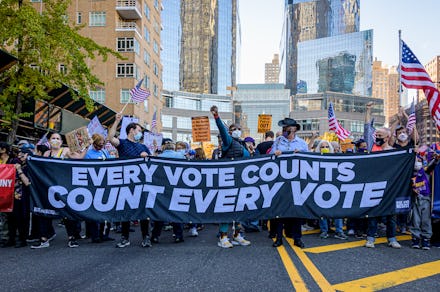The neverending 2020 election continues as Texas sues to overturn election results

In a stunning political move one week before electoral college representatives are set to certify November's general election, Texas's top lawyer filed a suit against four states challenging their election results. The states in question — Michigan, Pennsylvania, Georgia, and Wisconsin — have all certified election results in favor of President-elect Joe Biden. Some have even done so multiple times. Experts say that the last-ditch effort contradicts typical election proceedings and normal state executive behavior.
Texas Attorney General Ken Paxton filed the suit with the Supreme Court early Tuesday morning. The suit claims that election integrity in the four swing states, each of which went for President Trump in 2016 and flipped for Biden this year, were compromised by the coronavirus pandemic and faulty state election leadership. These states "exploited" the pandemic to "justify ignoring federal and state election laws and unlawfully enacting last-minute changes, thus skewing the results of the 2020 general election," the suit claims. Texas Gov. Greg Abbott (R) supported the baseless claims.
If Paxton's late-in-the-game effort seems odd, that's because it is, and for a number of reasons. First, a high-ranking lawyer of a large state should know that the Supreme Court only hears these kinds of suits if lower courts have not yet ruled on the issue. But multiple Trump campaign lawsuits in other battleground states alleging some form of voter fraud failed because voter fraud really doesn't exist; lower court judges have already thrown out these baseless cases. Moreover, election officials in the states Paxton believes delivered compromised election results have wholeheartedly rejected the premise of the lawsuit. "The allegations in the lawsuit are false and irresponsible," Georgia's deputy secretary of state, Jordan Fuchs, said in a statement Tuesday, according to the Texas Tribune. "Texas alleges that there are 80,000 forged signatures on absentee ballots in Georgia, but they don’t bring forward a single person who this happened to. That’s because it didn’t happen."
Dana Nessel, Paxton's peer in Michigan, wrote on Twitter that his effort is nothing more than a "publicity stunt." Nessel went on to say that it's efforts like Paxton's that erode democratic processes and faith in American electoral systems, rather than perceived voter fraud — which, again, doesn't exist on any significant scale. "Paxton's actions are beneath the dignity of the office of attorney general and the people of the great state of Texas," Nessel wrote.
The late-stage suit also illuminates fissures among the Trump loyalists and Trump appointees. Trump's close ally, Attorney General Bill Barr, told the Associated Press that there was no evidence of determinative voter fraud.
Just over a month out from Biden's inauguration, University of Texas professor Steve Vladeck wrote that the suit is likely to stay where it is now — in a dark corner of the Supreme Court — for quite a while given how slowly the judicial system moves. A decision on this suit can't be made until the nine justices actually decide to hear oral arguments, but even then, Vladeck writes, "It's going to take forever to decide whether to hear it — which almost certainly means that the whole thing will be moot before that happens."